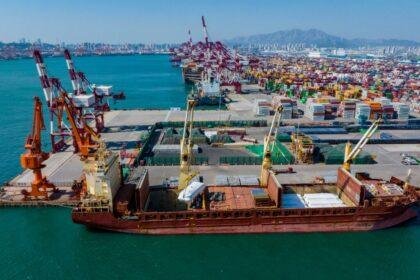IKEA Expands U.S. Operations with Acquisition of Logistics Firm Locus
Published: October 8, 2025
In a strategic move to enhance its delivery capabilities and bolster online sales, IKEA has announced the acquisition of U.S.-based logistics technology company Locus. This partnership aims to streamline IKEA’s logistics operations, making deliveries more efficient and responsive to customer needs. The announcement was made on Tuesday, marking a significant step in IKEA’s ongoing efforts to adapt to the evolving retail landscape.
A Strategic Acquisition
While the financial details of the acquisition remain undisclosed, reports indicate that Locus was valued at approximately $300 million during its last funding round in 2021. The acquisition is part of a broader $2.2 billion investment by Ingka Group, IKEA’s largest franchisee, aimed at expanding its footprint in the competitive U.S. market. This market is characterized by fierce competition from e-commerce giants like Wayfair and Walmart, as well as challenges posed by rising tariffs on imported goods.
Parag Parekh, Chief Digital Officer at Ingka Group, emphasized the importance of this acquisition in a recent interview. He stated that the integration of Locus’s technology is expected to reduce IKEA’s global delivery costs by an estimated €100 million (approximately $117.41 million) annually. This cost-saving measure is crucial as IKEA navigates the complexities of the current economic climate, which has seen increased operational costs due to tariffs and supply chain disruptions.
Enhancing Customer Experience
Locus specializes in using artificial intelligence to optimize logistics operations. The technology allows for the grouping of orders and the prediction of delivery routes that minimize traffic delays. Currently, these planning processes are handled manually by IKEA employees, making the transition to Locus’s automated system a significant upgrade.
The acquisition is expected to provide IKEA customers with more flexible delivery options, including a variety of delivery windows and real-time tracking updates. Parekh noted that while speed is a critical factor, the flexibility and enhanced tracking capabilities will significantly improve the overall customer experience. The technology will initially be piloted in the U.S. and the UK before being rolled out globally.
A Shift in Retail Strategy
IKEA’s acquisition of Locus is part of a broader shift in the company’s retail strategy. Traditionally known for its expansive blue-box stores filled with a wide range of home furnishings, IKEA has increasingly focused on enhancing its online presence. Over the past five years, the company has invested heavily in smaller urban stores and digital platforms to attract younger, more urban consumers.
This shift is reflected in IKEA’s sales figures, with online sales accounting for 28% of total retail sales in the 2024 financial year, a significant increase from just 11% in 2019. The growing importance of e-commerce in retail has prompted IKEA to adapt its business model to meet changing consumer preferences.
Navigating Economic Challenges
The acquisition comes at a time when the retail sector is grappling with various economic challenges, including inflation and supply chain disruptions. Despite these uncertainties, IKEA remains committed to its U.S. expansion plans. Just a week prior to the Locus acquisition, Ingka Investments made headlines by purchasing a building in Manhattan for $213 million, signaling a strong commitment to growth in the American market.
Parekh acknowledged the macroeconomic uncertainties but reiterated the company’s dedication to the U.S. market. “In terms of the macroeconomics around us, there’s probably uncertainty in the quarters ahead. But as a company, we remain committed to the U.S.,” he stated.
The Future of IKEA
As IKEA continues to evolve, the acquisition of Locus represents a pivotal moment in the company’s journey. By leveraging advanced logistics technology, IKEA aims to not only enhance its operational efficiency but also improve customer satisfaction. This move aligns with broader trends in the retail industry, where companies are increasingly turning to technology to meet the demands of a digital-first consumer base.
The integration of Locus’s capabilities will likely position IKEA to better compete in a rapidly changing market. As the company navigates the complexities of modern retail, its focus on innovation and customer experience will be crucial in maintaining its status as a leading global furniture retailer.
Conclusion
IKEA’s acquisition of Locus marks a significant step in the company’s ongoing efforts to enhance its logistics and delivery capabilities in the U.S. market. By investing in advanced technology, IKEA aims to streamline operations, reduce costs, and improve customer experience. As the retail landscape continues to evolve, this strategic move positions IKEA to remain competitive and responsive to the needs of its customers. The future of IKEA looks promising as it embraces innovation and adapts to the challenges of the modern retail environment.









